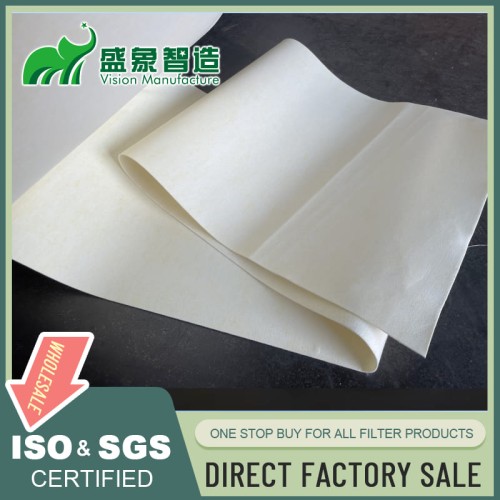
Filter Fabric Rolls: Versatile Solutions for Customized Industrial Filtration
I. Introduction
Filter fabric rolls are essential components in the industrial filtration sector, offering tailored solutions to meet diverse operational demands. This introduction discusses the significance of filter fabric rolls, their role in enhancing industrial filtration processes, and their potential for customization to suit specific application needs.
II. Understanding Filter Fabric Rolls
Filter fabric rolls are continuous lengths of fabric used in the filtration of air, liquids, and particulates. This section will detail:
- Definition and Basic Characteristics: Explaining the form and function of filter fabric rolls in industrial applications.
- Types of Materials Used: Including polyester, polypropylene, nylon, and others, each offering unique benefits.
- Manufacturing Processes: Covering woven, nonwoven, and felted techniques that influence the fabric's properties and suitability for different filtration tasks.
III. Key Properties of Filter Fabric Rolls
The effectiveness of filter fabric rolls is derived from their intrinsic properties:
- Filtration Efficiency: Ability to effectively remove particulates from fluids or air.
- Permeability and Flow Rates: Determines how easily fluids can pass through the fabric.
- Durability and Strength: Ensures the fabric can withstand operational stresses.
- Chemical Resistance: Allows use in environments with corrosive substances.
- Temperature Tolerance: Suitable for operations in various thermal conditions.
- Customizable Widths and Lengths: Can be tailored to specific dimensions required by different systems.
IV. Applications in Industrial Filtration
Filter fabric rolls are utilized across a broad spectrum of industries due to their adaptability:
- Air Filtration Systems: Used in HVAC systems and industrial air cleaners.
- Liquid Filtration Processes: Essential in water treatment and chemical processing.
- Dust Collection: Employed in systems capturing industrial dusts.
- Water and Wastewater Treatment: Plays a role in the purification and treatment processes.
- Food and Beverage Industry: Ensures compliance with health standards in production.
- Chemical Processing: Filters out impurities in chemical manufacturing.
- Automotive and Aerospace Industries: Used in filtration systems within these sectors.
V. Advantages of Filter Fabric Rolls
The benefits of using filter fabric rolls include:
- Cost-effectiveness for Large-Scale Applications: Economical for extensive use due to bulk availability.
- Customization Capabilities: Can be cut and shaped to meet specific operational requirements.
- Ease of Cutting and Fabrication: Simplifies the process of fitting the fabric into existing systems.
- Versatility Across Industries: Suitable for a wide range of applications due to adaptable properties.
- Inventory Management Benefits: Easier to store and manage due to standardized rolls.
VI. Types of Filter Fabric Rolls
Various types of filter fabric rolls cater to specific needs:
- Woven Filter Fabrics: Known for their strength and precise filtration capabilities.
- Nonwoven Filter Materials: Offer versatility and cost-effectiveness for general applications.
- Needle Felt Rolls: Provide excellent depth filtration properties.
- Membrane-Coated Fabrics: Enhance filtration efficiency and selectivity.
VII. Selecting the Right Filter Fabric Roll
Choosing the appropriate filter fabric roll involves:
- Factors to Consider: Such as micron rating, material compatibility, and specific application needs.
- Performance Requirements: Ensuring the fabric meets operational demands.
- Environmental Conditions: Compatibility with the chemical and thermal environment.
- Vision Filter's Approach: Leveraging expertise to recommend the best fabric solutions.
VIII. Fabrication and Installation
Proper fabrication and installation are crucial for maximizing the performance of filter fabric rolls:
- Cutting and Shaping Techniques: Tailoring the fabric to fit specific systems.
- Seaming and Joining Methods: Techniques that ensure integrity and performance.
- Installation Best Practices: Ensuring optimal fit and function within the filtration system.
- Quality Control Measures: Critical to maintaining the reliability of the fabric in operation.
IX. Maintenance and Care
Effective maintenance extends the life and functionality of filter fabric rolls:
- Cleaning Procedures: Regular cleaning to maintain filtration efficiency.
- Inspection for Wear and Damage: Routine checks to identify and address potential issues.
- Replacement Guidelines: Understanding when to replace fabric to maintain system integrity.
- Extending Fabric Life: Best practices to maximize the lifespan of the fabric.
X. Environmental and Sustainability Aspects
The sustainability of using filter fabric rolls is considered through:
- Recyclability: Focusing on materials that can be recycled at the end of their lifecycle.
- Energy Efficiency: Minimizing energy consumption during manufacturing and operation.
- Waste Reduction Strategies: Implementing practices that reduce waste production.
- Vision Filter's Commitment: Dedicated to sustainable manufacturing and operational practices.
XI. Innovations in Filter Fabric Technology
Advancements in filter fabric technology include:
- Advanced Fiber Blends: Enhancing performance through innovative material combinations.
- Nanofiber-Enhanced Fabrics: Utilizing nanotechnology to boost filtration efficiency.
- Smart Fabrics with Sensing Capabilities: Incorporating functionalities that respond to environmental changes.
- Vision Filter's Contributions: Leading the development of cutting-edge solutions in filter fabric technology.
XII. Case Studies: Filter Fabric Rolls in Action
Real-world applications demonstrate the effectiveness of filter fabric rolls in various industries, showcasing their ability to solve complex filtration challenges and deliver significant improvements in performance and operational efficiency.
XIII. Future Trends in Filter Fabric Technology
The future of filter fabric technology looks promising, with potential advancements in material science and integration with smart systems enhancing their applicability and efficiency.
XIV. Conclusion
Filter fabric rolls continue to play a crucial role in industrial filtration, offering a versatile and efficient solution that meets a wide range of industrial needs. As the demand for precise and sustainable filtration solutions grows, Vision Filter remains dedicated to providing cutting-edge solutions and expert consultation to help industries achieve optimal filtration performance.
Leave a comment

